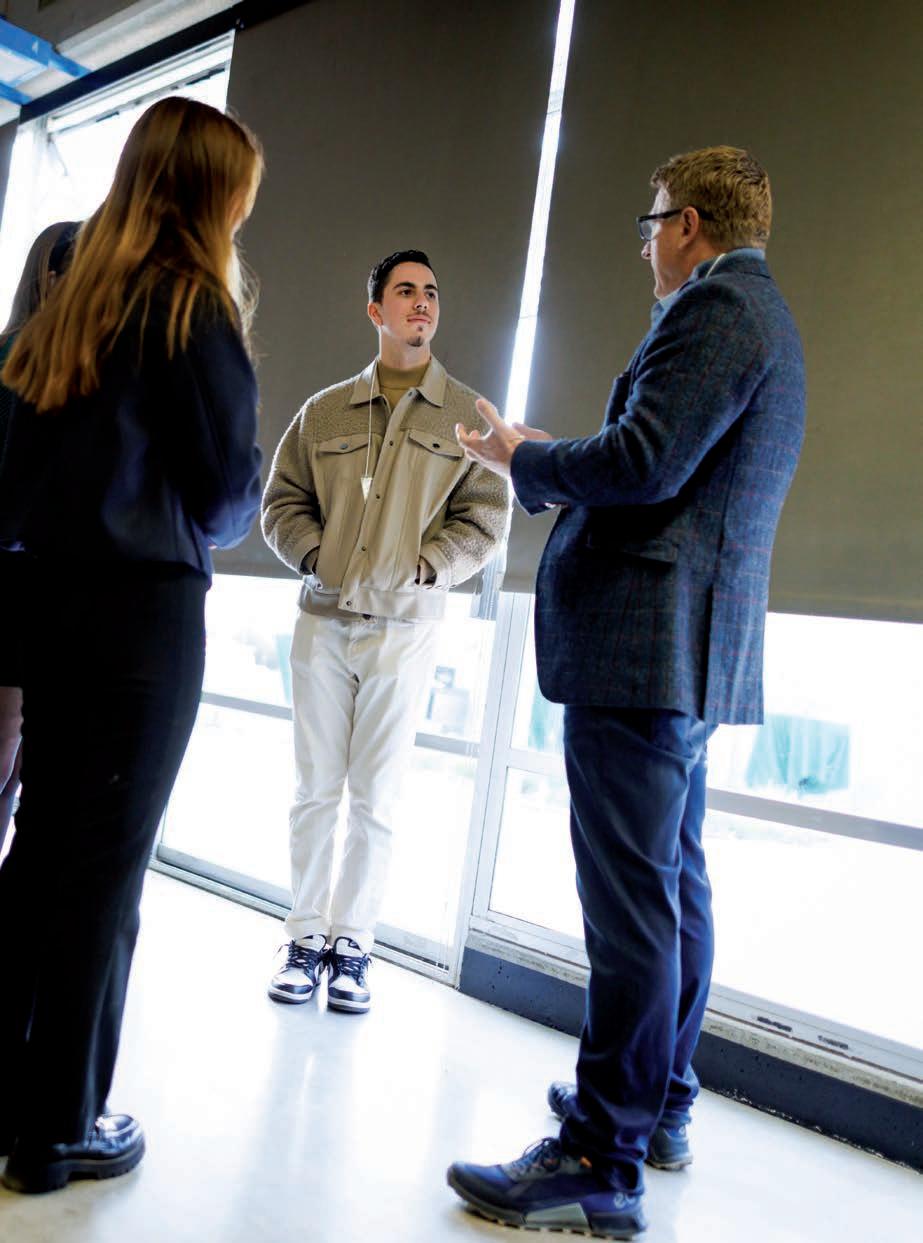MUSTANG NEWS
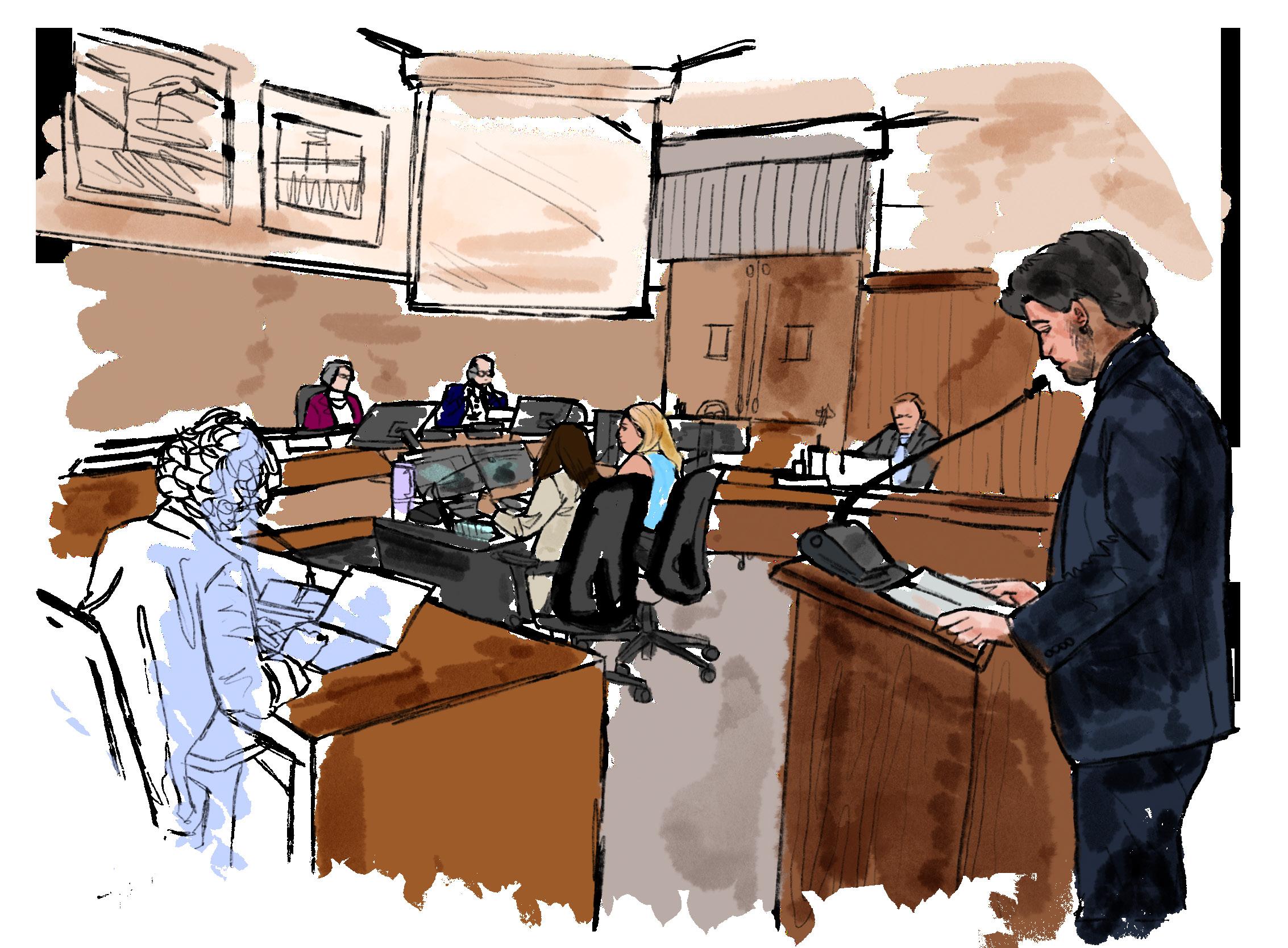


Tensions rise between long-term residents, Greek life and the city
Pg. 04
CAL POLY STUDENTS
OVERWHELMINGLY VOTED YES ON PROPOSITION 50
Pg. 12
A COMMUNITY POKER LEAGUE THRIVES AT ‘BARCADE’
Pg. 20
THE TEA DATING SAFETY APP AIMS FOR SAFETY, BUT CAUSES HARM

ARCHANA PISUPATI Editor in Chief
JEREMY GARZA Managing Editor
AVIV KESAR Creative Director
CARLY HELTZEL News Editor
LEILA TOUATI Digital Director
NEWS
Carly Heltzel News Editor
Bella Cox Assistant News Editor
Kaylin O’Connell Assistant News Editor
Caroline Ohlandt Print/Copy Editor
Abby Gorman
Alan Ko
Alexander Kohm
Angel Corzo
Ashley Strain
Emi Valero
Ella Steere
Everlynn Dionne
Ginger Perez
Grace Gillio
Katy Clark
Maya Reiken
Nishita Mukherjee
Rebecca Von Tersch
Riya Minglani
Sam Fickett
Seth Pintar
OPINION
Landon Block Opinion Editor
Ash Pickett
Avery Adelini
Kaylie Wang
Larena Tannert
Maddie Kuhns
Mariko Garrett
Shayna Gayer
Madi Taylor Satire Columnist
Malia Mundy Satire Columnist
SPORTS
Amanda Avila Sports Content Director
Charlie Wiltsee Sports Editor
Dylan Allen Sports Video Editor
Ty Soria KCPR Sports Director
Joslen Jimenez Sports Social Media Manager
Matthew Muren Assistant Sports Editor
Ali Tafesh
Amery Gill
Andrew Aguinga
Ava Acuesta
Ava Keshtkar
Giada Mennucci
Grace Nishanian
Isabella Fierros
Jonathan Oliver Marburg
Lilia McCann
Noemi Bascara
Javin Hennessy
Quinlan TeSelle
Rocco Brichler
Samantha Roach
Tyler O’Neal Westerweck
Aviv Kesar Creative Director
Anika Loganathan
Ava Cheung
Ava Donaldson
Elena Vaughan
Julia Hazemoto
Kennedy Ray
Maya Shinden
Meher Anklesaria
Natalia Celebrini
Nhi Duong
VIDEO
RJ Pollock MNTV Director
Lauren Quijano Assistant Director
Aneka Edwards
Chloë Schauermann
Delaney Hill
Dylan White
Kimber Draughon
Mia Muzzi
Parker Cinque
Roman Noravian
Sedona Harris
PHOTO
Soha Roy Photo Editor
Amery Gill
Bia Sommers
Chloe Briote-Johnson
Emma Arredondo
Henry Miller
Joe Capra
Léa Bourges-Sevenier
Liz Bennett
Lloyd Esola
Mia Dahlgren
SOCIAL MEDIA
Gabrielle Ottaviano Social Media Manager
Chloe Gilb
Eva Grove
Kaitlyn Knopf
Leah Orsini
Maya Ziv
Olivia Roman
Sedona Harris
Sydney Hecht
DATA & INVESTIGATIONS
Alie Hall Data Editor
Addie Weaver
Amy Truong
Beck Schemenauer
Dilraj Dhaliwal
Julia Aptekar
Kaviya Veerasingam
Nicole Yee
BILINGUAL
Evelyn Santa Rosa Bilingual Editor
Addison Uhl
Isabella Beltran
Suri Moreno
KCPR
LEADERSHIP
Kat Orozco Content Director
Fiona Hastings News Director
Linnaea Marks Art Director
Amelia Nored Programming/Music Director
Jeremy Okmin Marketing Director
Ben Shane Podcast Director
Bailee Isackson Photo Editor
Peyton Kelly Social Media Manager
KCPR NEWS
Fiona Hastings News Director
Riley Sullivan Assistant News Director
Ty Soria Sports Director
Alyssa Parikh
Amanda Avila
Brendan McCann
Cayden Tan
Charlie Wiltsee
Delaney Ridder
Diego Puga Escobar
Dylan White
Evelyn Santa Rosa
Giselle Espinoza
Katy Clark
Keegan Oates
Lauren Quijano
Lia Griffiths
Lily Segelman
Mackena Losin
Randi Ingoglia
Ryan Giocamini
KCPR CONTENT
Kat Orozco Content Director
Marley Logan Editorial Assistant
Angie Stevens
Asmahan Karam
Ayla Boose
Ella Giuliani
Elsa Fuentes Virabyan
Emilia Pirir
George Meza
Iris Langen
Ishaani Dhanotra
Joe Forrestdavis
Lorenzo Cano
Max Brode
Olivia Nieporte
Rebecca Von Tersch
Sarah Jagielski
ADVERTISING & PR
Logan Teixeira Advertising Manager
Sydnie Bierma Special Sections Editor
Zoë Laureta Marketing and Public
Relations Director
Nicolas Parrott Marketing Assistant
Ruby Beye Small Team Manager
Angie Ho Small Team Manager
ADVERTISING DESIGNERS
Alex Nishida Design Team Manager
Christine Kim
Lucas Winger
Maya Shinden
Teia Kornienko
ADVERTISING ACCOUNT EXECUTIVES
Katelyn Carrera Senior Account Executive
Tara Davari KCPR Account Executive
Akshay Perumal
Janalee Taguia
Julia Moore
Kyle Stefan
Maz Reeder
Quinn Southall
Ruby Beye
Wesley Bea
SPECIAL SECTIONS WRITERS
Sydnie Bierma Editor
Abby Moran
Allison Weil
Ava Welcher
Ginger Perez
Ishaani Dhanotra
Julia Nunez
Kate Roarke
Lillian Dolph
Maxine St. Sure
Samantha Orradre


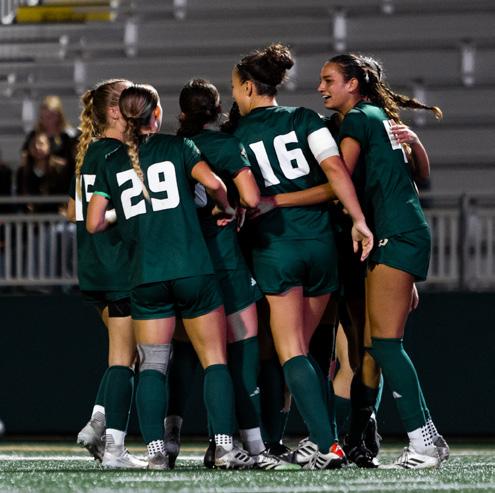
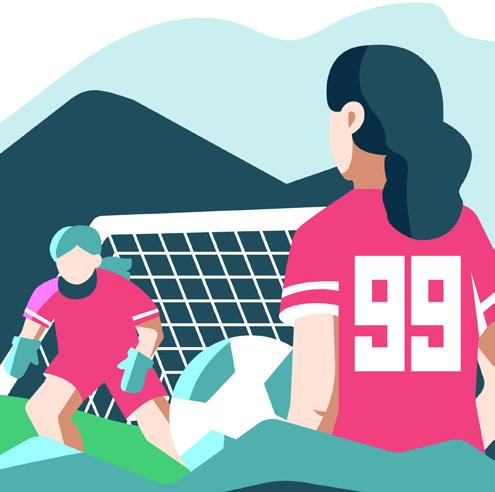

Schlitt
Bisheff
Teufel
Gearhart MNTV Adviser
JEREMY

Cal Poly presents plans to control St. Fratty’s this
Cal Poly Women’s Soccer’s journey back to Big West contention
What

Even at Mustang Media Group, midterm season hits like a train. We’re writing this letter right before we send it off to the printers. Stories in these spreads have come in amid project due dates, midterm study sessions and a major night for all journalists: Election Day.
Some of the stories in these spreads have huge implications on our community — how students feel about Proposition 50, the international student experience or the city’s relationship with Greek organizations.
Other stories, like the feature on the ‘barcarde’ downtown, may seem less serious. But the truth is, all the stories in these pages affect or comment on the student experience at Cal Poly. These experiences affect how we go to class, how we watch sports or how we party on Thursdays.
Even at times where stress is high, a story doesn’t wait for anyone. It festers waiting to be told and will wither if it’s not caught quick enough. For many MMG staff members, this month felt like this. We were chasing the stories and deadlines with a resistance parachute.

And, not to toot our own horn or ring our own bell, we’re pretty good at what we do. Last month, we were in Washington D.C. at the annual Associated Collegiate Press conference and won second place in the nation for our October print edition, among the nearly 30 other awards we collected.
Reflecting back on the last couple of months, we are grateful for your engagement with our content. We aren’t driven by winning or recognition; we are committed to serving you. Though some recognition is nice, we can’t lie.
Reading your Instagram comments, conversations in pass ing and emails have given us a clear snapshot of what our audience looks like right now — and especially how we can better serve you.
Understanding where our audience is most active is key to meeting you where you already are and refining how we connect with you. This quarter, we’ve focused on producing multimedia content to support your media consumption habits. Whether it’s a podcast, Instagram story or longform feature, this issue connects you to stories that matter through the platforms you engage with the most. There will continue to be watershed moments this year where the news will create conversations and more often than not, debates. As a student-run news organization, we are part of the community we serve. Now, more than ever, our coverage is integral to igniting conversations across campus. We don’t know what’s coming next, but we are looking forward to it showing up on your Instagram feed, Spotify podcast player or web browser soon.
SINCERELY,
ARCHANA PISUPATI EDITOR-IN-CHIEF
JEREMY GARZA

LIKE LISTENING TO YOUR NEWS INSTEAD? TUNE INTO OUR
We discussed last month’s MMG recap and this month’s goals! POD FROM THE EDITORS WE WANT TO HEAR FROM YOU! SUBMIT A LETTER TO THE EDITOR

Please make the subject line [Letter to Editor, Topic — First name/Last name]. We require all letters to the editor to be signed with a name.


that indicated they will be voting on Proposition 50, 70.12% said they were voting yes, whether that be in person or through mail-in ballot.
Some 70% of students surveyed by Mustang News said they planned to vote yes on Proposition 50, in support of temporarily redrawing California’s congressional maps. This compares to the 56.22% who voted yes in San Luis Obispo County and 63.9% overall as of Nov. 7.
Proposition 50, the recent California ballot initiative which passed in the special election, asked voters on Nov. 4 to approve new congressional districts that favor Democrats. This proposition comes after the Texas Legislature passed a new plan in August to increase the number of congressional seats for the Republican Party and maintain its majority in response to pressure from President Donald Trump, as previously reported by the Texas Tribune.
Mustang News received responses from 643 students, 16% of those who received the survey. Of the students
“I believe that Californians should exercise their state right to propose citizen propositions to make a move to correct this cheating from other states for our democracy,” Nathan Perez, a city and regional planning junior, said.
Perez described how it is in California tradition to let citizens decide whether to participate in midterm redistricting, while other states are doing so without citizen support.
Nutrition freshman Kate Vander Veen opposes Proposition 50 because she does not believe gerrymandering is good in any capacity.
“It is important to display the ideas that we have in this state fairly and the way we do it with a nonpartial organization is the way to do it,” Vander Veen said. “We shouldn’t give the power back to the state legislatures to section districts.”
About 39.5% of the survey respondents said that they believed half of Cal Poly students were aware of the upcoming special election. Methods of awareness, whether that be television advertisements, social media or conversations with parents, differed from student-to-student.
Kate McHugh, a political science senior who supports Proposition 50, first became aware of the proposition by reading the news. Continued discussions in her Voting Rights and Representation class, POLS 445, also helped her to feel more informed as a voter.
“I feel like the fact that the president is outwardly telling Republican majority states that they should partisanly gerrymander their maps to give the Republicans a better chance of having more seats is going against the kind of system of
checks and balances that we have,” McHugh said.
While McHugh said that non-partisan redistricting is the most fair way to redraw district lines, these times are unprecedented.
“I would normally support the nonpartisan way that we have to typically draw our lines, but in extenuating circumstances, which I would categorize these times, I can appreciate the need for more direct action against the president and his administration,” McHugh said.
History sophomore Ethan Lue leaned towards voting yes on Proposition 50 because of the current political environment and what Trump is doing by asking states to redraw districts.
However, he thinks the proposition “is a bit antidemocratic as it is disenfranchising voter groups.”

INTERVIEW BY CARLY HELTZEL & JEREMY GARZA
DESIGNED BY MEHER ANKLESARIA
Political science and journalism senior Charlie Nichols spent the past two summers living in the West Bank, about 20 miles northwest of Gaza. He documented life in the West Bank and the greater conflict in Palestine.
Mustang News Managing Editor Jeremy Garza and News Editor Carly Heltzel sat down with him to hear about Nichols’ experiences in the region with a digital presence he calls Project Walsh. Nichols has no affiliation with Mustang News, and his opinions expressed in this interview do not necessarily represent those of the organization.
Nichols discussed the most impactful moments and what he learned about the media. Here’s what he had to say:
CARLY HELTZEL: AS THE PROJECT EVOLVED, HOW DID THE GOALS OF THE PROJECT EVOLVE AS YOUR MINDSET SHIFTED OR CHANGED OVER TIME?
CHARLIE NICHOLS: The motto for Project Walsh is ‘get the truth or die trying’ and that was really what I was trying to do, and that’s always been the mindset, especially during the first trip to the West Bank. I was in the city of Jenin. It’s a ghost town because there’s live combat going on just a few hundred yards away. We’re coming around a bend and couldn’t really see past it, and there was one kid on the side of the road that was waving at us like ‘You need to stop.’ Luckily, the one guy in the passenger seat saw that was happening and told [the driver] to slam on the brakes. If we had driven down that road, [the Israel Defense Forces] would have seen two Palestinians in the front seat and probably would just open fire on us, no questions asked. So that kind of puts the fear of God into you and kind of makes you realize the stakes. When people make life-threatening situations an obstacle to the truth, or they just make death an obstacle to the truth, you can’t shy away from it. Or else those people then win.
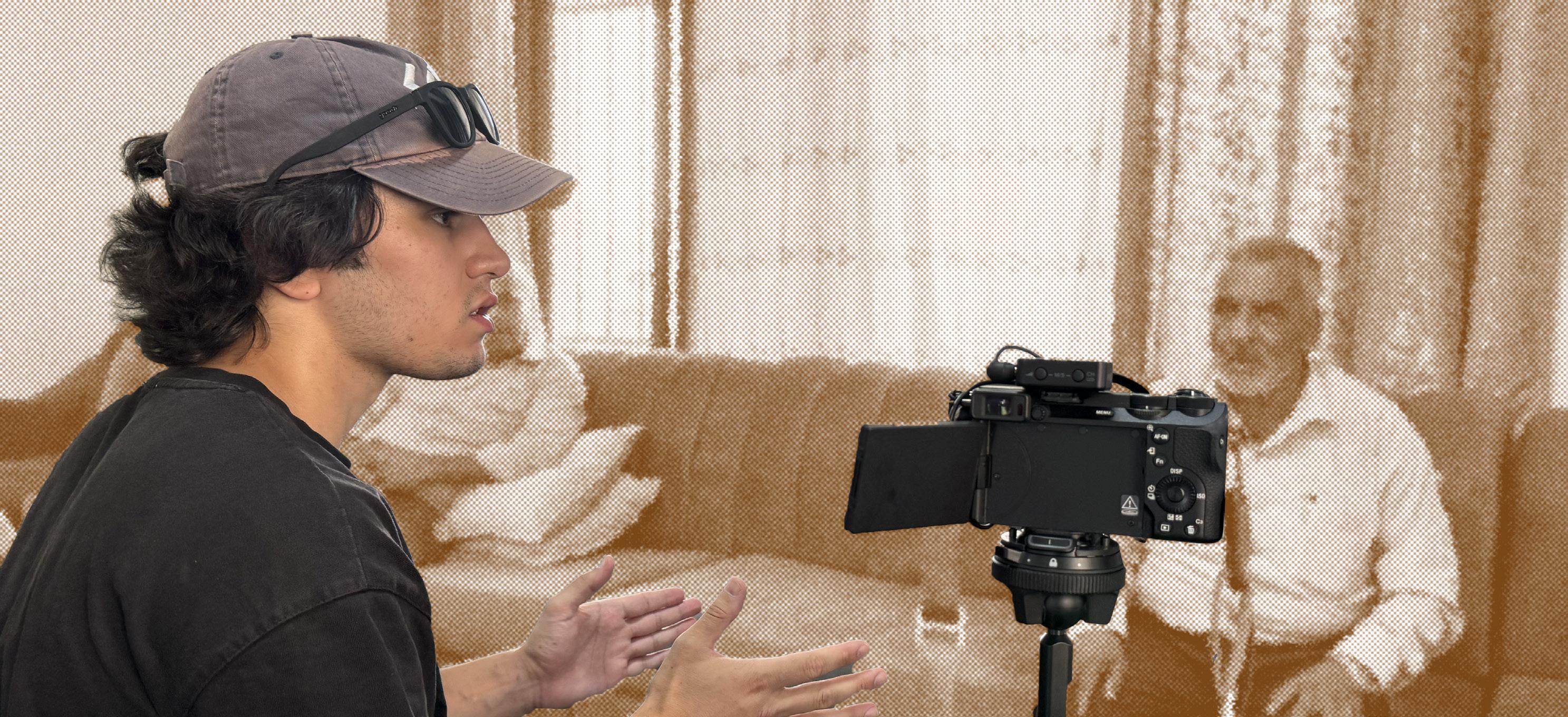
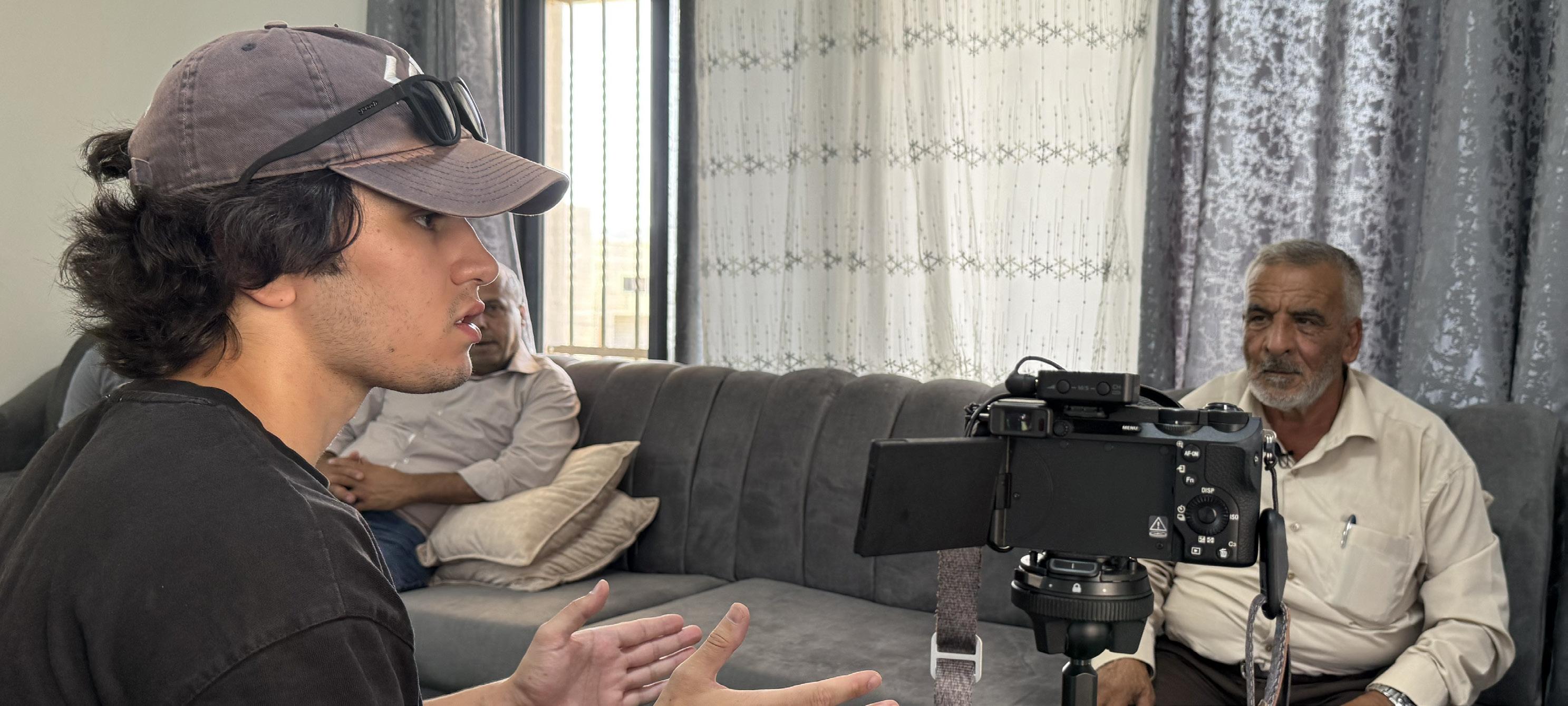
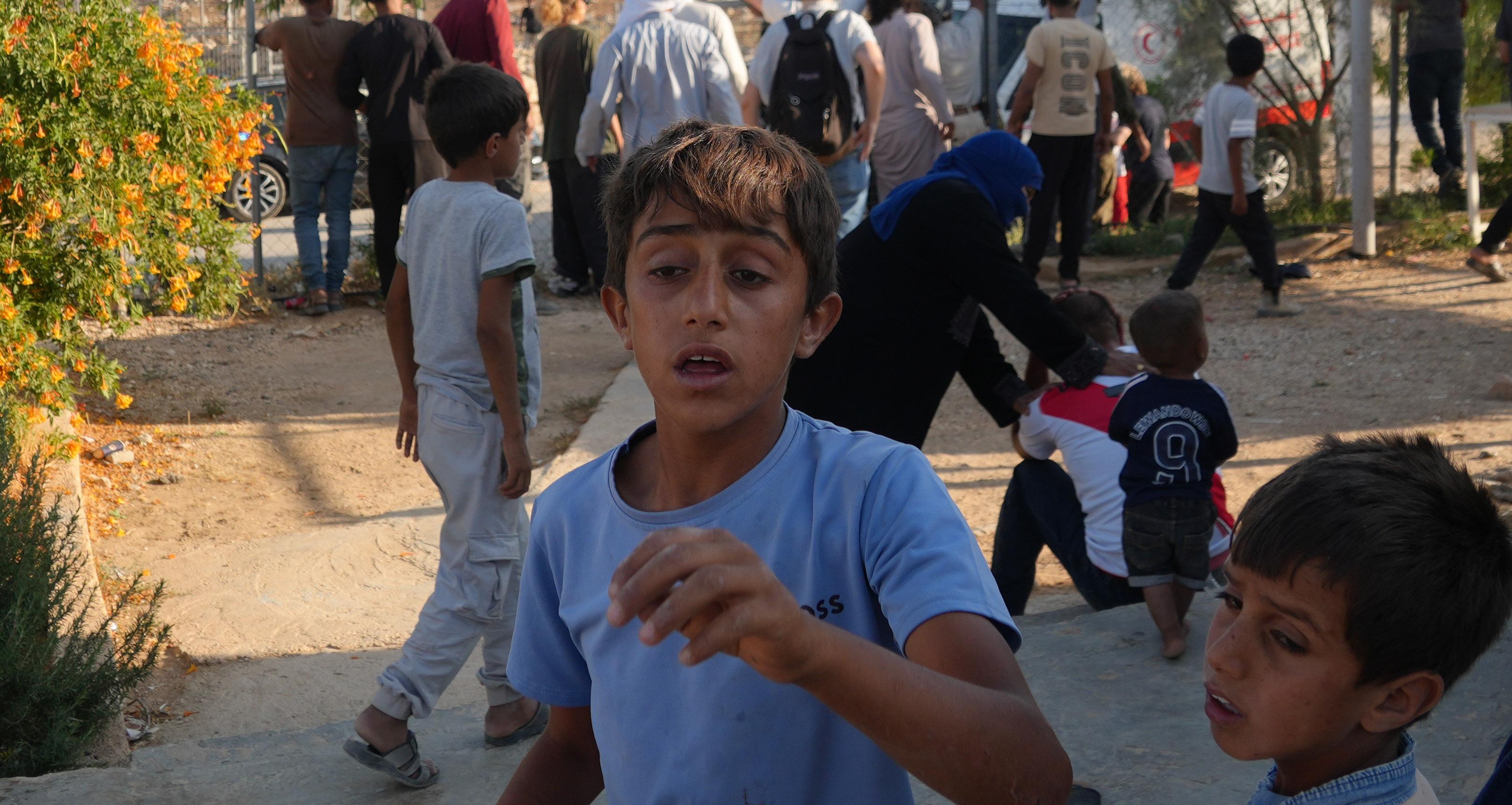
JEREMY GARZA: WHAT ARE SOME OF THE MOST IMPACTFUL STORIES THAT YOU WERE ABLE TO DOCUMENT OR JUST WITNESS WHILE YOU WERE THERE?
C.N.: I saw Awdah Hathaleen [a Palestinian activist] shot and killed right in front of me by Yinon Levi [an Israeli] in what I can only call an act of terror. Awdah was an internationally renowned Palestinian human rights activist. He contributed to the film No Other Land. He was a firmly pro-peace guy.
That day, there was an Israeli construction company doing work on a plot of land that was right next to Um al Kher’s [a small city in the West Bank] community center. On that piece of land, there was a backhoe equipped with a jackhammer. Basically, that backhoe had begun destroying Palestinian property on Palestinian land, so they had crossed out of the staked property that they had taken. It was running over olive trees that Palestinians depend on for income. There were people throwing stones at the backhoe; it was armored.
I saw Yinon Levi walk in between a crowd of people that had come up to the backhoe and then, within half a second, I saw his handgun in his hand. He was kind of wildly waving it around. Nobody attacked him. Nobody threw stones at him. In one of the videos that I had taken, you can hear me go, “He’s going to kill somebody.” Literally moments later, he fired off shots, and one went directly over my head and killed Awdah while he was yards away behind a fence, recording the entire incident.
I didn’t realize how close I was to the bullet until somebody retrieved photos or a video from Awdah’s phone. You can see the back of my head in that entire video, the back of my shirt. I saw him bleeding on the ground. I knew just from how thick the pool of blood was on the ground and just how people reacted that it was pretty dire.
The Israeli authorities allowed settlers to come up and essentially jeer at the people who were doing first aid. They brought out Yinon Levi after he just killed Awdah, obviously not in an act of self-defense. They allowed him to point out people to arrest while we were caged in this area. The Israeli government in the West Bank is in complete control of this situation.
C.H.: GOING BACK TO THE KILLING OF AWDAH AND GENERAL MEDIA COVERAGE OF PALESTINE AND OF THE CONFLICT: HOW DO YOU FEEL LIKE THE MEDIA COVERAGE HAS IMPACTED THE WAY PEOPLE PERCEIVE THE SITUATION THERE? HOW DO YOU FEEL LIKE PROJECT WALSH CONTRIBUTES TO THAT?
C.N.: To give a lot of the major outlets credit, their coverage has gotten a little bit better since October seventh [at presenting] the reality of what’s happening. I think that in a lot of Western journalism, there’s a certain obsession with neutrality to the point where you’re no longer being neutral, where you’re going to portray both sides of a conflict as even teams.
Robert Fisk, a British guy famous for the reporting he did on Lebanon in the 80s and also Palestine, described it as ‘This is not a soccer match in the Middle East. This is a tragedy.’ It’s a system of oppression. And I think that that’s hard for a lot of news outlets to deal with and properly portray, especially since Israel is a client state of the United States. I did a lot of stuff with mapping and showing different locations being like this is an actual place. These things are happening to actual people.
J.G.: YOU MENTIONED WHEN YOU’RE TALKING TO A YOUNG BOY WHO WAS SHOT IN BOTH HIS LEGS THAT IT’LL NEVER LEAVE YOU. HAS THIS EXPERIENCE AND THE STORIES THAT YOU’VE HEARD AND WITNESSED INFLUENCED YOUR PERSPECTIVE ON LIFE OR EVEN YOUR LIFE GOALS MOVING FORWARD?
C.N.: I think seeing the Israeli apartheid in the West Bank firsthand, I don’t really know how to describe it, but there’s just this certain kind of misery that comes with it. Everywhere you go, you’re going through these checkpoints where there’s a gun pointed at you during the whole experience. This is a life without hope.
It’s really hard to forget that feeling and try to walk away from it when you know that your tax dollars contribute to it. Because what should be a 20 minute ride to work takes three hours because there’s an Israeli checkpoint that decided to close that day. Or because somebody in your family got shot and there’s nothing you can legally do about it because you don’t have any rights under the legal system. Everybody had a story there about how the Israeli occupation had affected them in one of these awful ways.
Tensions rise between the city, residents and Greek life amid complaints over noise, illegal fraternity houses and neighborhood livability
Members of Delta Chi in the audience of the Oct. 21 city council meeting.
that allows a specific land use, according to the SLO County website.
Fraternity and sorority members operating an active Greek life house must apply for a CUP. The permit for fraternities and sororities has regulations that permit holders agree to follow; permits can be revoked if these guidelines are not followed.
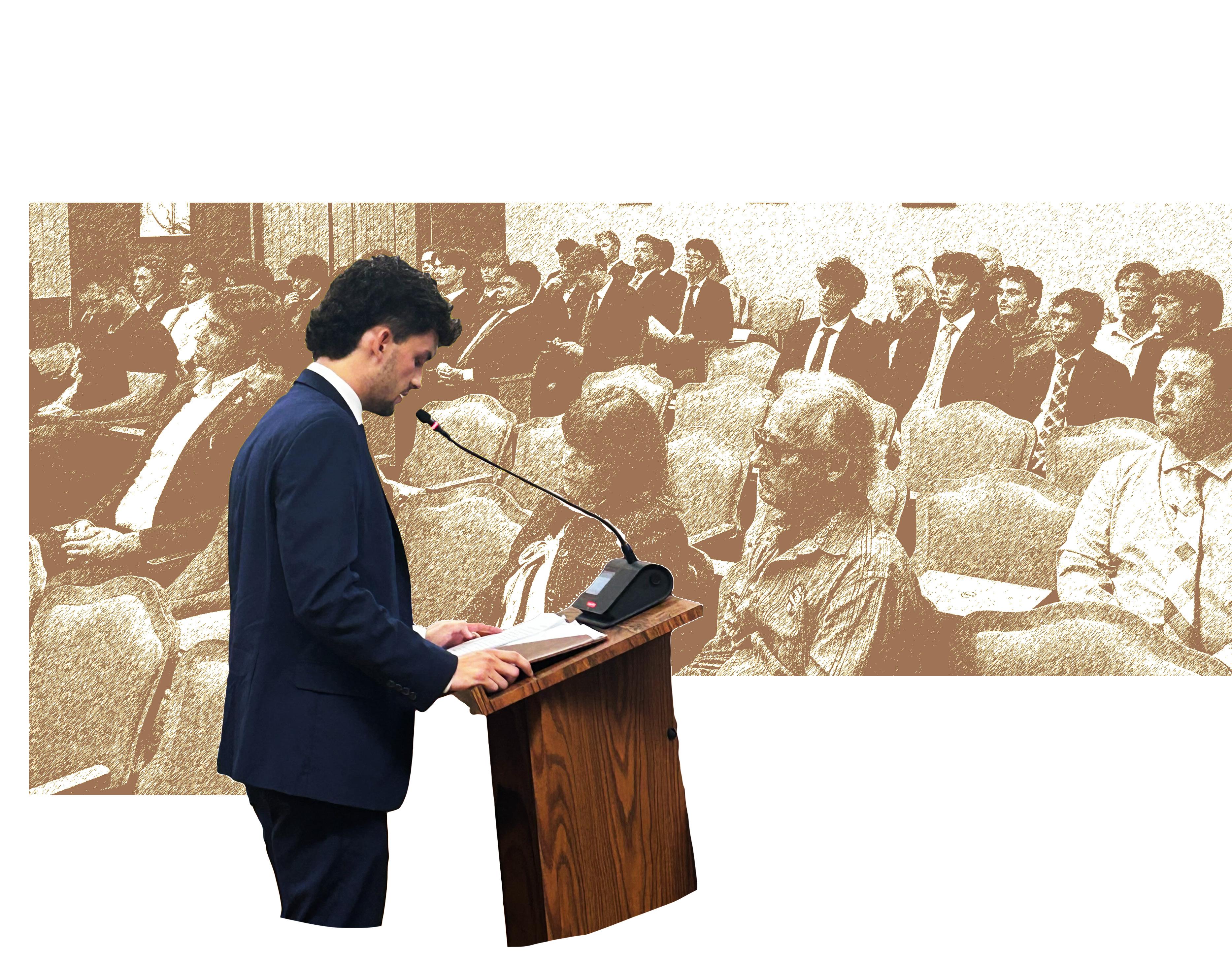
STORY BY KATY CLARK AND FIONA HASTINGS
DESIGNED
BY ANIKA LOGANATHAN
San Luis Obispo City Councilmember
Jan Marx used to live on Albert Drive right by Cal Poly’s campus, an area that has a high student population. During the pandemic, the number of garage parties taking place elevated, eventually becoming too much for Marx and her family. They moved to a more “family-oriented neighborhood.”
“Across Grand Avenue and up in the hills used to be very well integrated and over time it’s become dominated by student-aged people,” Marx said. “So the few remaining long-term residents in those neighborhoods are the ones that are under tremendous stress.”
These stresses, which stem from topics including illegal street parties,
satellite fraternity housing outside of their designated zones and high noise levels, have resulted in numerous complaints by residents that led to a Grand Jury investigation.
In June, the San Luis Obispo Grand Jury issued the report, “Round & Round with Town & Gown,” investigating and discussing multiple complaints by longterm residents about neighborhood livability, including unauthorized fraternity houses operating in zoning-restricted residential areas. The city responded to the report in September, detailing which recommendations they would accept.
The role of the San Luis Obispo Grand Jury is to investigate matters of civil concern, according to the SLO County website.
The Grand Jury determined six key findings, including the failure of the city to enforce the prohibition of fraternity and sorority activity in
It felt a little late to be coming in from the Grand Jury, and a little almost like a slap in the face to, as though we didn’t care at all.
ERICA STEWART
San Luis Obispo Mayor
low- and medium-density residential zones that do not allow Greek life houses. The Grand Jury also found a failure to enforce conditional use permits (CUPs), which is a permit
However, San Luis Obispo Mayor Erica A. Stewart believes the Grand Jury overlooked the city’s work to ease tensions and improve safety for all, such as the alternative St. Fratty’s event that resulted in fewer citations and student misconduct that morning, according to previous Mustang News coverage.
“It was a little challenging in the Grand Jury report to have barely a nod to all of the work that had been done to make a huge difference from last year to this year,” Stewart said. “It felt a little late to be coming in from the Grand Jury, and a little almost like a slap in the face to, as though we didn’t care at all.”
The city accepted four of the Grand Jury’s recommendations, including the continuation of the city’s collaboration with Cal Poly to shut down illegal street parties, for the SLO City Manager to develop a process to identify illegal fraternity housing and for more uniform conditions and enforcement of CUPs.
The city is not planning to implement the other three recommendations,including R4, R5 and R7, saying they are unwarranted or unreasonable.
“I think there’s a long-term frustration from community members who have lived here for a while, feeling as though Cal Poly administration hasn’t always enforced their own rules or hasn’t had strict enough rules around behaviors that are inappropriate,” Stewart said.
Marx said that communication in the neighborhood has diminished. “People are more inclined to just not talk about it, call the police,” Marx said. “And some of the student-age people are just like ‘It’s a college town, get over it, I’m going to piss in your front lawn.’” Stewart said that while there are existing noise issues associated with fraternity and student parties, the consistency of these complaints have resulted in a spike of regular day-today complaints with things such as 8-year-olds playing basketball in the neighborhoods and quinceañeras.
“I think we are at a place too where we have to bring things a little more together,” Stewart said.
“People get to make some noise.”
Neighborhood livability is a current 2025-2027 goal for San Luis Obispo, according to previous Mustang News coverage, as an effort to address these issues.
LONG-TERM RESIDENTS FEELING NEGLECTED BY CITY AND CAL POLY
A number of residents have been forced to move, Brett Cross, a representative for Residents for
Quality Neighborhoods on ASI’s Student Liaison Committee said.
Cross talked about a family who purchased a home next to the wife’s father so they could be next to the father as he got older.
“They were forced to leave and sell, and the father was forced to leave too,” Cross said. “It’s terrible. I mean that shouldn’t happen. He lived in that home for 60-plus years and then had to leave because of the impacts from the satellite fraternity activity happening in those neighborhoods. It was really heartbreaking.”
The Grand Jury report also discussed residents’ complaints about being ignored by city and Cal Poly officials, as the complaints alleged failure to enforce existing rules and municipal ordinances towards fraternities, and that they did not take enough action to restore order.
“They’re having really serious impacts on their neighbors,” Cross said. “And I don’t know what it’s going to take to get them to recognize that. I wish they would recognize that, because it would make everyone’s life a lot better.”
Cal Poly removed the addresses of sanctioned events in their annual reports made in accordance with the Campus-Recognized Sorority and Fraternity Act, according to John Mezzapesa, code enforcement supervisor for the city.
University spokesperson Matt Lazier said the university made the decision to remove these addresses out of concern for student privacy, and they comply with the act, which was designed to keep track of fraternity and sorority life at each institution of higher learning in California in publishing the addresses of chapter houses and events where misconduct has occurred.
“These changes to how information is collected and reported eliminate the city’s ability to administratively determine if violations have occurred,” Mezzapesa said. “The city now must try and collect evidence such as social media posts and perform inspections and interviews to determine if a
sanctioned event has taken place.”
Citizens complained about “illegal fraternities” in low- and medium-density residential zones, with party-related noise as one of the most frequently brought up issues, according to the Grand Jury’s report.
“It’s not a real word,” Stewart said, referring to people using the term “illegal.” “The illegal part is based on our municipal code, where we have a fraternity house that may not be following the code. However, we also have a code that says you can’t have your trash can in a certain place. You don’t become an illegal house because you have your trash can in a certain place.”
Stewart clarified that the community uses the illegal term in response to a house that is operating “like a fraternity house,” due to the possibility of not following Cal Poly or city rules.
Fraternities can not apply for conditional use permits in low- and medium-density zones, according to Stewart. Fraternities and sororities are only able to apply for a conditional use permit to operate their house in medium-high and high-density residential zones.
FRATERNITIES IMPACTED BY THE TENSION
With Cal Poly fraternities at the core of the investigation and community complaints, recent action has reflected the imbalance between Greek life presence and long-term SLO residents. Recently, fraternities like Sigma Nu and Delta Chi have had their conditional use permits revoked, and these revocation processes have sparked conversations around fraternity life in the city. The presidents of Sigma Pi, Sigma Phi Epsilon, Phi Sigma Kappa, Delta Upsilon, Sigma Nu, Alpha Sigma Phi and Delta Chi declined to comment
for this article. Mustang News has reached out to other fraternity presidents including Phi Gamma Delta, Phi Delta Theta, Kappa Sigma, Beta Theta Pi, Phi Kappa Psi, Theta Chi,
I believe it’s important to set standards and hold people accountable, especially young people who are going to go out into the world and do all kinds of wonderful things.
JAN MARX
San Luis Obispo City Councilmember
Delta Sigma Phi and Pi Kappa Phi and did not receive a response. The web version of this article will be updated upon any response.
On Oct. 21, the City Council voted 4-1 to deny Delta Chi’s appeal to the decision to revoke their conditional use permit on their house on Monte Vista Place. However, the permit was conditionally revoked, meaning that within a 60-day timeframe, the fraternity can apply for a modification of the CUP, which is a quarter of the cost
for an application for a new CUP. That 60-day period expires on Dec. 20.
Councilmember Marx proposed the chance for modifications and said they should not enable a continuation of a party culture that is destructive to the city.
“I heard a lot of ‘Give us another chance, we want to collaborate,’” Marx said. “I didn’t hear any remorse. I didn’t hear any apology for what this particular fraternity has created for us.”
Marx believes it is important to set standards to hold young people accountable who are going to go out into the world.
Delta Chi Treasurer Jack Werle told city council his fraternity chose to appeal in order to remain in the city’s framework and promote positive change.
“Revoking our CUP now before a new model is even in place would remove one of the few organizations working with city staff to build a stronger, more effective system,” Werle said at the city council meeting in which Delta Chi’s appeal was denied.
Jesse Grothaus, Delta Chi and Cal Poly alumni and current SLO resident, said during the public meeting that while living next to student housing is not always easy and the frustrations are real, he has seen another side of
the story in regards to Delta Chi. Grothaus said revoking the CUP would get rid of the tool that enables progress, as he believes his chapter is invested in engaging positively with their neighbors and taking accountability for issues on their end.
“This is a town that prides itself on unity,” Grothaus said. “When challenges come up, we show up. We talk to each other. We look for solutions together and that’s part of what makes SLO so special. We don’t turn away from problems, we work through them as a community.”
Stewart and Marx recognized this relationship between longterm residents and students goes both ways, as mutual safety and enjoyment are a leading priority.
“We’re trying to do our best to do kind of a course correction now for a future where people can live in harmony and really enjoy all the good things about living in the city,” Marx said.
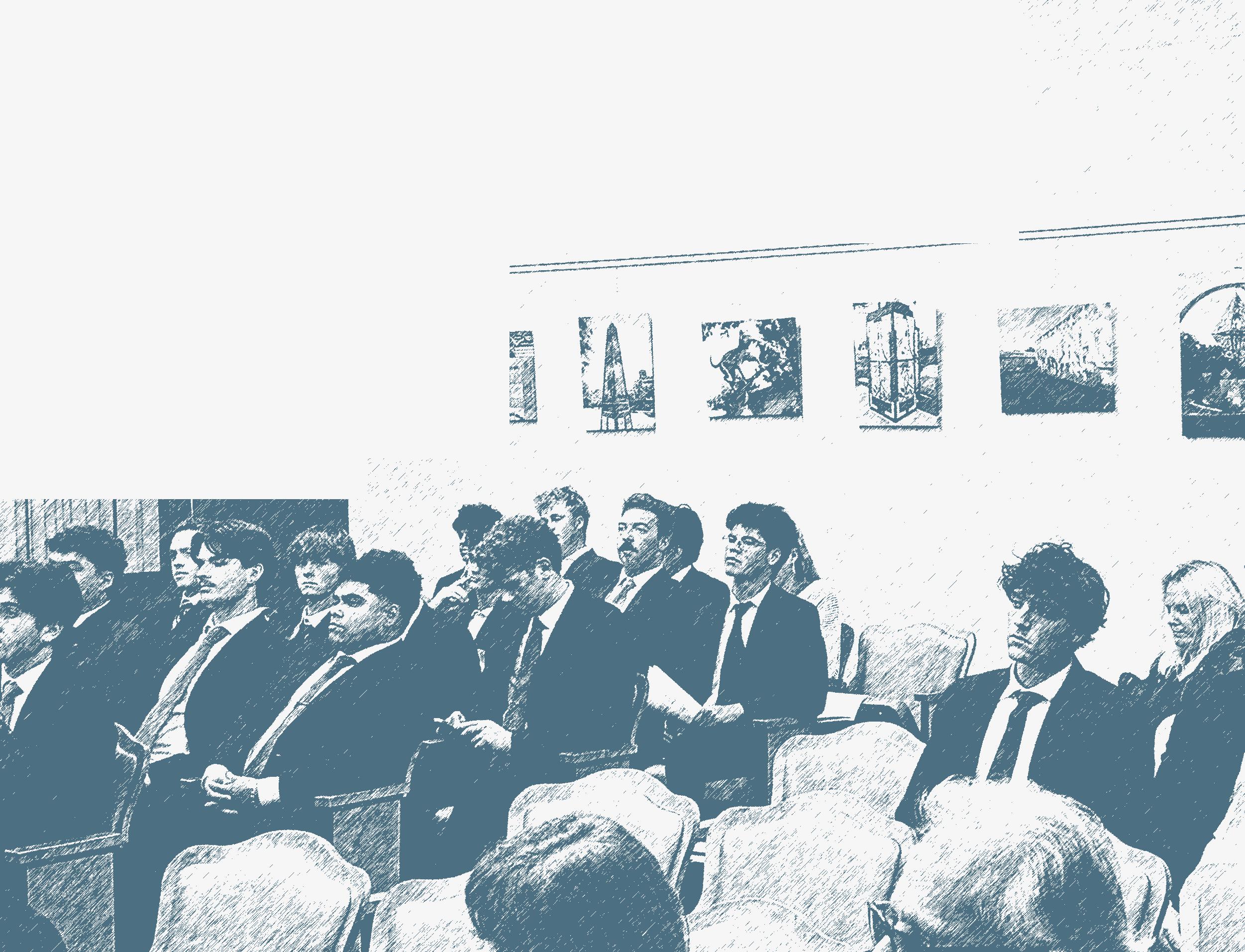
STORY BY RIYA MINGLANI
DESIGNED BY NHI DUONG
This story was originally published on kcpr.org and mustangnews.net on Nov. 4.
Cal Poly plans to control St. Fratty’s this school year by once again hosting an alternative event with ASI and the InterFraternity Council. The San Luis Obispo City Council voiced their concerns about students needing more event space during a special city council meeting on Oct. 28.
“Our goal this year is to provide a safe, positive and engaging experience for our students,” Allison Baird-James, Cal Poly Vice President of Administration and Finance said. “That really encourages them to celebrate responsibly and in partnership with the community.”
This is an ongoing effort by Cal Poly administration working with the City of San Luis Obispo to reduce student disturbance in San Luis Obispo, particularly on St. Patrick’s day.
According to Baird-James, the changes made to St. Fratty’s last year resulted in 75% less citations, 76% less student conduct cases, 60% fewer medical transports and a major drop in vandalism.
The event is said to be early in the morning of Saturday, March 14 with a concert and festival layout. It will be designed to hold more students than it did last year, when ASI limited the concert to 5,000 tickets. BairdJames notes Cal Poly is actively working with San Luis Obispo law enforcement and community partners to ensure the safety of this event.
“We’re really looking at what were the lessons from last year and what we can do to improve upon things,” Baird-James said.
Councilmember Emily Francis brought up the issue of lack of event space for students later in the meeting.
“From our hearing last week, something we saw come out of that is demand for event space, gathering space,” Francis said, referencing the Oct. 21 city council meeting about fraternity Delta Chi getting their permit revoked after they received noise and unruly gathering citations from the city.
This discussion stemmed from the broader issue of San Luis Obispo and Cal Poly wanting to minimize large gatherings of students while Cal Poly also plans to add more Greek chapters and increase enrollment.
“We understand the demand, from a student perspective as well, for what we kind of consider third spaces,” Terrance Harris, Vice President of Strategic Enrollment and Student Affairs said. “Those are spaces outside of the classroom, where students can meet and gather.”
Harris notes Cal Poly hopes to increase student organizations and Greek chapters so students can be more spread out and meet in smaller groups. He also mentions Cal Poly is adding more on-campus spaces for events like a student success center.
“The demand is not going to go away,” Harris said. “We know that and we recognize that.”









The SLO Chapter of the California Faculty Association (CFA-SLO) wish to honor those faculty who recently earned promotions as well as all the other faculty who played an important part in the promotion process. Remember, faculty support faculty!
Students, please congratulate these faculty on their milestone and support CFA in its work to protect the success and improve the working conditions of all faculty, counselors, coaches, and librarians.
College of Liberal Arts (CLA)
Marta Block Katya Cengel
Bethany Conway
April Elliott
Alexander Flores
Thanayi Jackson
Jess Lee
Erin Martin-Elston
Patti Piburn
Ian Pines
Leah Ransom
Emily Ryalls
Jacob Sparks
Kristianne Toledo
Robert Wallace
Christopher Woodruff
Ava Thomas Wright
Orfalea College of Business (OCOB)
Jon James
Ajay Kathuria
Pratish Patel
Jack Wroldsen

College of Science and Math (CSM)
Tina Cheuk
Francesco Contu
Derik Frantz
Jeffrey M. Gervasi
Hunter Glanz
Billie-Jo Grant
Christine Hackman
Clint R. Hahlbeck
Bryce J. Jenkin
Sarah Keadle
Tatiana Kuriabova
Heather Liwanag
Colleen Marlow
Nathaniel Martinez
Stefanee Maurice
Chad Edward Miller
Jasmine Nation
Natasha Neumann
Christie O’Hara
Laura Ríos
Joni Roberts
Briana Ronan
Jafra Thomas

Katharine Watts
Alejandra Yep
College of Engineering (CENG)
Mohamed Awwad
Chuck Bland
Andrew Danowitz
Bruce DeBruhl
Ali Dehghan Banadaki
Steve Dunton
Dongfeng Fang
Thomas Katona
Mohsen Beyramali Kivy
Hans Mayer
Jennifer Mott
Rebekah Oulton
Maria Pantoja
Steffen Peuker
Majid Poshtan
William Saucier
Xuan Wang
Siyuan Xing
Jeff Zimmerman
College of Architecture and Environmental Design (CAED)
Amir Hajrasouliha
Alexander Hirsig
L. JoAnn Moore
College of Agriculture, Food, and Environmental Sciences (CAFES)
Samir Amin
Yiwen Chiu
Juliana Huzzey
Mohammed Abo Ismail
Kevin Lin
Yamina Pressler
Daniel Rodrigues
Susan Snyder
Stewart Wilson
Library
Leyla Cabugos














DYLAN
Donnie Sunshine and participants of the league celebrate another successful poker tournament.
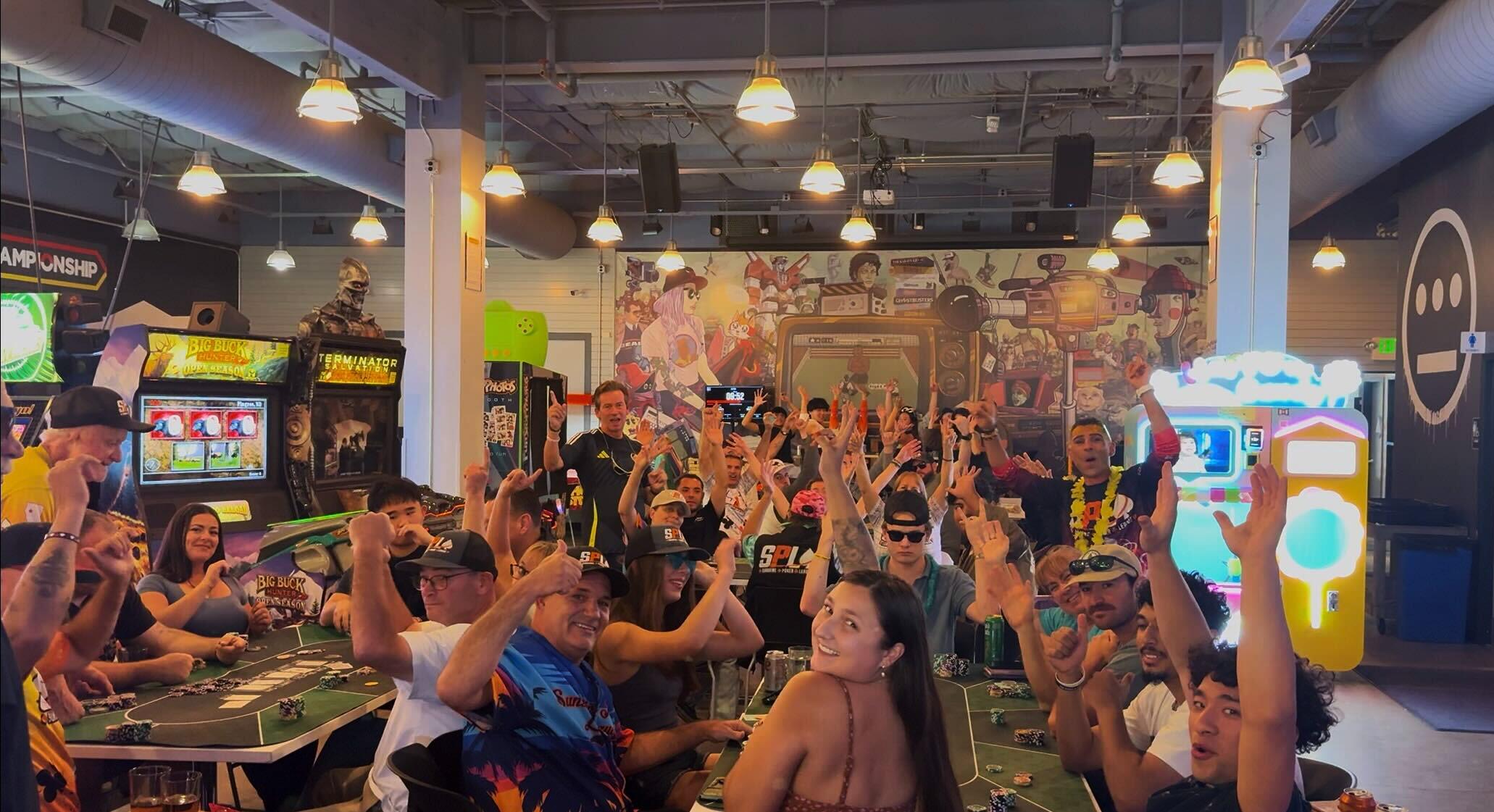
STORY BY DYLAN WHITE DESIGNED BY ELENA VAUGHAN
This story was originally published on kcpr.org and mustangnews.net on Oct. 20.
Downtown at the far end of Higuera Street, the sound of classic arcade games, like Ms. Pac-Man and House of the Dead 2, fill the air of BA Start Taproom and Eatery, also known as the “Barcade” by locals and students. Every Sunday afternoon, the sound of shuffling of poker chips takes over the Barcade when it hosts the Sunshine Poker League, a community-focused group that swaps high-stakes gambling for friendly competition.
The poker league’s founder Donnie Sunshine said that the events go deeper than just playing poker and gambling. Despite the possible $100,000 grand prize, Sunshine said that is not why competitors come to play.
“It’s a community-driven, social poker league,” Sunshine said. “There are no buy-ins or gambling.
My purpose is to bring people together, no matter the race, the color, the religion, the background, I don’t care. Bring people together just to hang around the table, play the game that we all love. We win some, we’ll learn some.
DONNIE SUNSHINE
Sunshine Poker League Founder
Ninety-nine percent of it is bringing the community together, supporting local and having a good time.”
SUNSHINE SEES POKER AS MORE THAN JUST THE GAME
For Sunshine, who has played poker for over two decades, the league represents something deeply personal.
“My personal purpose is to be that change I want to see in this world,” he said. “My purpose is to bring people together, no matter the race, the color, the religion, the background, I don’t care. Bring people together just to hang around the table, play the game that we all love. We win some, we’ll learn some.”
Sunshine’s story began in Philadelphia, where Donnie Hoss spent two decades playing poker with a local league called River Chasers. During that time, he earned the nickname “Donny Sunshine,”
a name that stuck throughout his poker career. When Hoss moved to California seven years ago and founded his own league, he drew on that identity, naming it the Sunshine Poker League in honor of the persona that had long defined his place in the game.
“I moved here from the beautiful city of Philadelphia, the city of brotherly love,” he said. “I played there for about 20 years with a group called River Chasers. I’m not a big gambler. For me, it’s more about investing your time and energy in people.”
When he relocated to California seven years ago, he brought that same energy with him. His bracelet, which reads “Strangers to friends and friends to family, one day at a time,” has become the league’s motto.
What started as one small local event has since grown to include 22 bars across the state, from San Jose to Bakersfield to Los Angeles, with new locations soon launching in San
Diego. The league also partners with local spots like Round Table Pizza in Atascadero and several bars in Santa Maria, Orcutt and Lompoc.
“We try to find local businesses that might be slow on a Monday or Tuesday night and bring people together,” Sunshine said.
THE PARTNERSHIP BETWEEN BARCARDE AND POKER FITS NATURALLY
Rob Peterson, founder of the Barcade, said partnering with the Sunshine Poker League was an easy decision.
“Donnie’s very like-minded with us, and it was just great to have him be a part of this,” he said. “When you run a business downtown, you get approached by a lot of people who want to host events, but Donnie stood out. He’s doing it for the right reasons.”
That shared mission, community
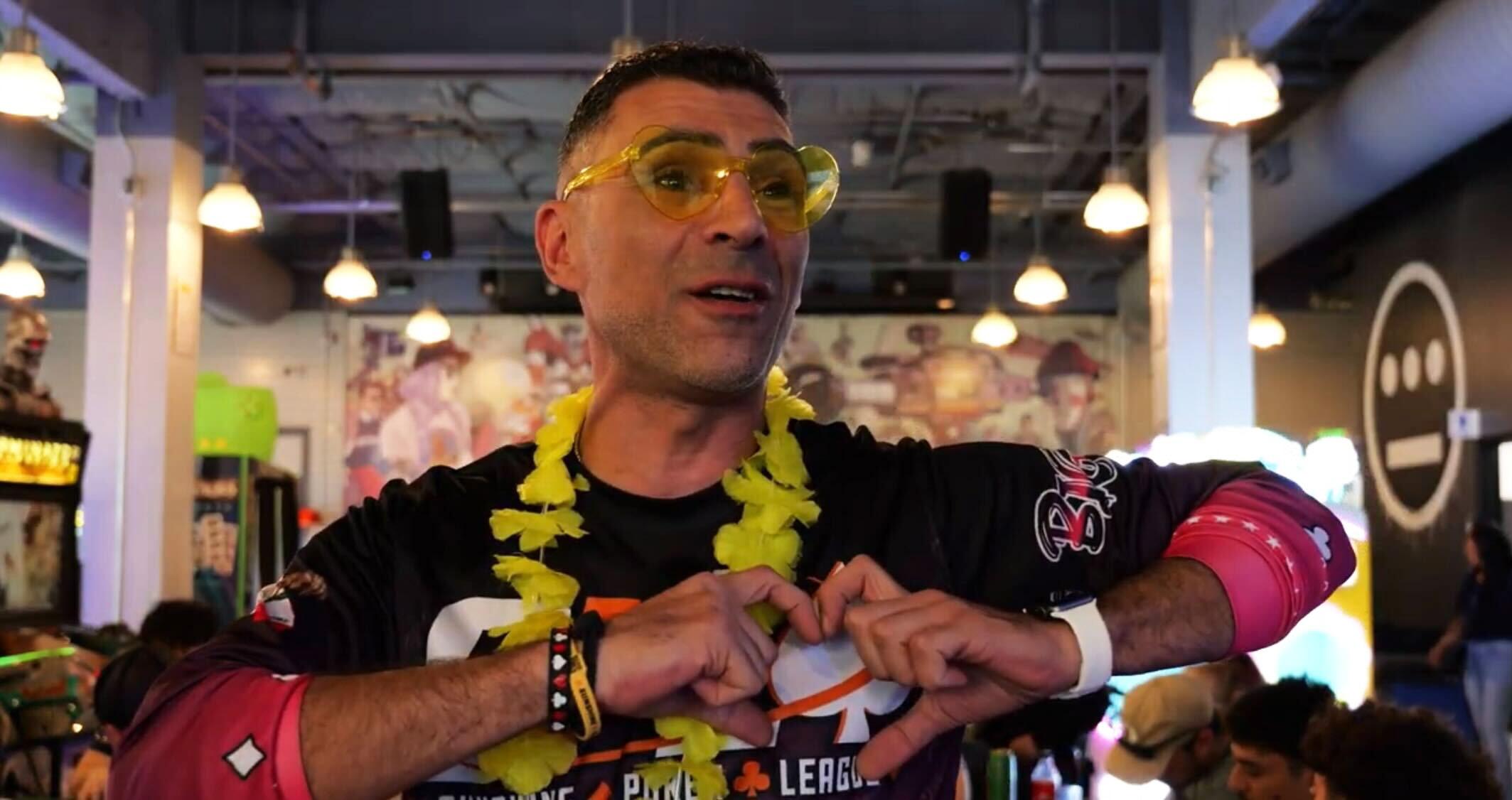

Participants getting ready to play their first game of the afternoon.
first, commerce second, has made Sundays at BA Start feel like more than just another poker night. The games draw a mix of college students, longtime locals and visitors who just wander in for a beer or a game of pinball.
By combining retro gaming with social poker, the unlikely pairing
of BA Start and the Sunshine Poker League has created a space in San Luis Obispo where the goal isn’t just to win, but to belong.
“Over time, we get to know one another,” Sunshine said. “The world will be a better place, I believe.” And for Peterson, that kind of energy is exactly why the partnership works.
“Come on down and have some fun,” he said. “We look forward to seeing you.”
The Sunshine Poker League transforms the Barcade into a place of deeper connection, blending the glow of old screens with the sound of poker chips to remind San Luis Obispo that community matters.
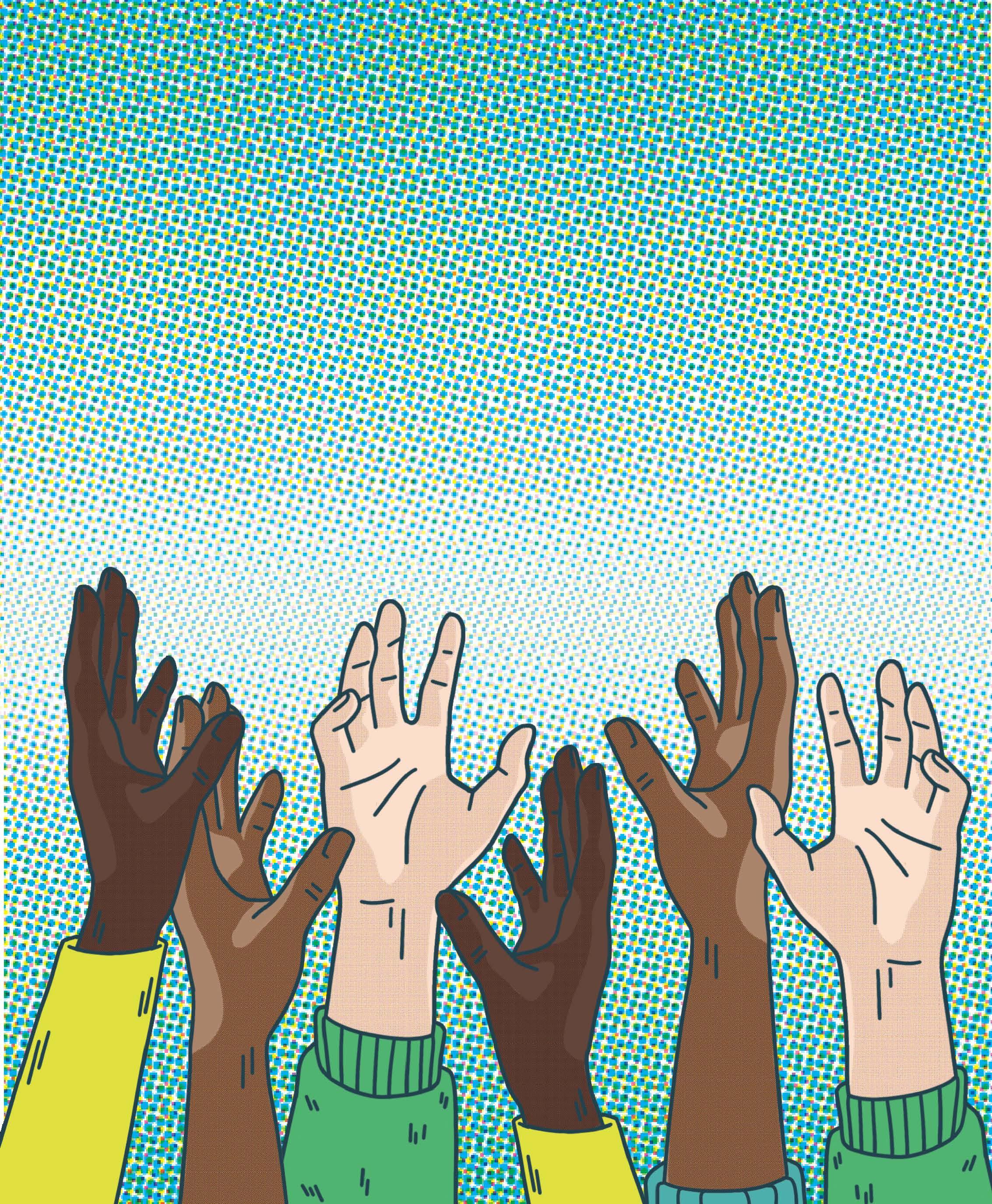








STORY BY NIISHITA MUKHERJEE
DESIGNED BY MAYA SHINDEN
When Anna Jones-Owen secured her visa appointment at the U.S. Embassy in London, she didn’t know she narrowly avoided a crisis. Just two weeks later, the Trump administration halted student visas — leaving thousands in limbo. Jones-Owen narrowly avoided what could have brought major concerns about her future as an international student at Cal Poly that coming fall.
After a visit to California with her family, and researching universities in the area, Jones-Owen decided to transfer from University of Birmingham to Cal Poly to study political science.
“I mean the process should have been pretty straightforward,” Jones-Owen said about her student visa procedure.
Two weeks after her visa appointment, Trump had announced his halt on student visas and nearing appointments at the Embassy were cancelled.
“Luckily I already had my appointment,” Jones-Owen said. "But when it came to other people, they didn’t know if they were going to be able to come or not, it was quite stressful. There was no warning, it came out of nowhere, and it didn’t become clear for a few weeks about what was actually going to happen.”
In recent months, changes under the Trump administration reshaped the international student experience in the United States. More than
1,800 international students lost their visa status, including 40 Cal State students who temporarily lost their visas, only to be given back after complaints and lawsuits. The restrictions and requirements have also increased for international students, including requiring all social media accounts to be public.
While Jones-Owen’s experience was marked by uncertainty, the process was much smoother for environmental management freshman Luca Fontes. Originally from Mazatlán, Mexico, Fontes has deep roots within the Cal Poly community — both Fontes’ dad, who is originally from Tijuana, and his mom who is from the Bay Area attended Cal Poly.
“Of course it is a big difference, sometimes I experience some culture shock. [But] people are very nice here and I just really got to highlight the weather,” Fontes said.
While Fontes’ journey to Cal Poly was fairly simple, he also acknowledged the broader difficulties international students face.
“We can tell how our government is shaping our country, and it’s not what anyone would want,” Fontes said.
With threats to the Operational Training Programs designed for STEM students to have work experience after graduation, many international students are deciding not to come to the U.S. or are leaving out of fear and uncertainty. Other international students expressed concerns about shortened visa durations and less job security.
With sudden administrative changes, the universities are not given any warning or context beforehand. “We often find out at the same time as students, which gives us limited time to gather all the information we need to respond to students’ questions,” International Student Coordinator Bianca Silva wrote in an email to Mustang News. Jones-Owen said “it was quite stressful cause it was out of nowhere where even Cal Poly did not know what was going on.”
has comparatively less. Cal Poly’s international students make up 2.2% of the student body.
The university’s approach to help diversify the campus and have a higher population of international students was designed based on practical resources such as money and student visas.
The strategy “allows the university to expand its international student population while managing budget limitations for overseas travel and responding to broader global and political factors affecting international mobility,” the Strategic Enrollment Management team wrote in an email to Mustang News.
We can tell how our government is shaping our country, and it’s not what anyone would want,
LUCA FONTES
International Student and Environmental Management Protection Freshman
Compared to other major California universities such as UCLA, where 7.6% of undergraduates are international, and UC San Diego with around 18% undergraduate international students, Cal Poly
While international students’ journeys have become more uncertain, the students who are able to come tend to experience culture shock and changes.
Fontes said he loves being able to surf and enjoys the mountains and greenery. Growing up in his hometown of Mazatlán, where summers are hot and humid, he said San Luis Obispo is a nice change.
Jones-Owen was attracted to Cal Poly for similar reasons, falling in love with the culture and scenery and wanting a change from the city life.
“When I visited California a few years ago with my family, I really liked the vibes and the weather,” Jones-Owen said. “I did my research
and ended up here.”
Since starting the school year, Jones-Owen found many administrative and cultural differences between England and the U.S..
“I think the whole standard of the school system is different. There is much more specialization,” JonesOwen said.
The changes aren’t all academic; they’re also social and cultural. Jones-Owen navigated new challenges finding community in Greek life and understanding the social normalities within itas well.
“I definitely did not know anything about the rush process at all. And English people cringe quite easily,” Jones-Owen described. “But I actually had the best time. I think because I was relaxed and did not have many expectations for it, it made the process quite enjoyable.”
Both international students offered advice for those hoping to attend Cal Poly.
Jones-Owen said while being an international student can seem glamorous, it’s a big step. “It is such a thing to romanticize being an international student, but you are going to be living so far away from home with a massive time difference,” she said.
Fontes recommended for students to look and apply for scholarships early.
“Opportunities aren’t really going to be given to you. You got to really be looking for what you want and what you want to achieve,” he said.





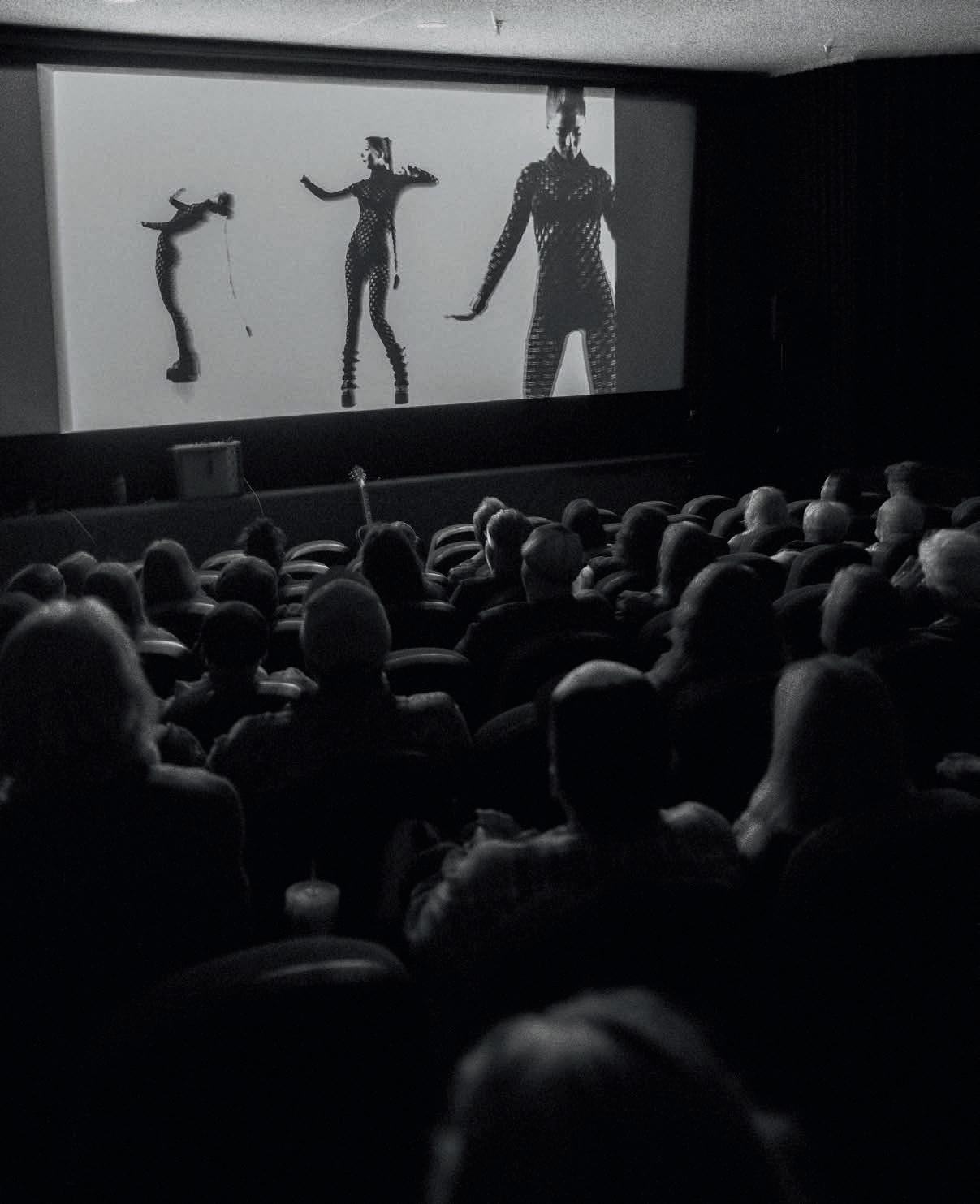


EXECUTIVE PRODUCER & MUSIC
COMPOSITION: TY SORIA
HOSTS: JONATHAN SZE, DYLAN ALLEN, MATTHEW MUREN
DESIGN: NATALIA CELEBRINI
This audio documentary was originally published on kcpr.org on Nov. 6.
The Gallop podcast created KCPR’s first-ever sports audio documentary, compiling interviews from a variety of sources such as insider interviews
from Mustang News.
Written and narrated by the hosts and accompanied by original music, this project paves the way for high-quality long-form journalism in Mustang News and KCPR.
For the first time in 12 years, Cal Poly Women’s Soccer won the Big West championship on Sunday, Nov. 9. Many players are excited to move on to the NCAA tournament after being eliminated in the conference finals in 2021 and 2023. Six Mustangs earned All-Big West honors for
the regular season after the team narrowly missed out on the first seed.
Junior forward Annika Smith earned Offensive Player of the Year and senior defender Brennan Cole earned Defender of the Year.
“I think the mindset from last year to this year is a huge difference,” Smith said. “Everyone this season is on the same page and is super committed to this team and I’m just so grateful for everyone around me because they put in a great shift every day, even during practices.”
Cal Poly went from missing the postseason to the most accoladed team of 2025, driven by changes in personnel, culture and on-field strategy.
The Mustangs had competed for the postseason chip every year exiting the pandemic, but had an incredibly disappointing 2024 season. To follow, the only head coach in program history, Alex Crozier, had planned to retire.
Also, many notable seniors were graduating, which left the rest
of the Mustangs to regroup under a new coach.
Coach Bernardo Silva, made several changes to personnel and team culture, labeling them with a rebrand called Cal Poly 2.0.
During the episode, the hosts explore what happened in Alex Crozier’s final years, the transition to Cal Poly 2.0, and what these changes look like on the field.
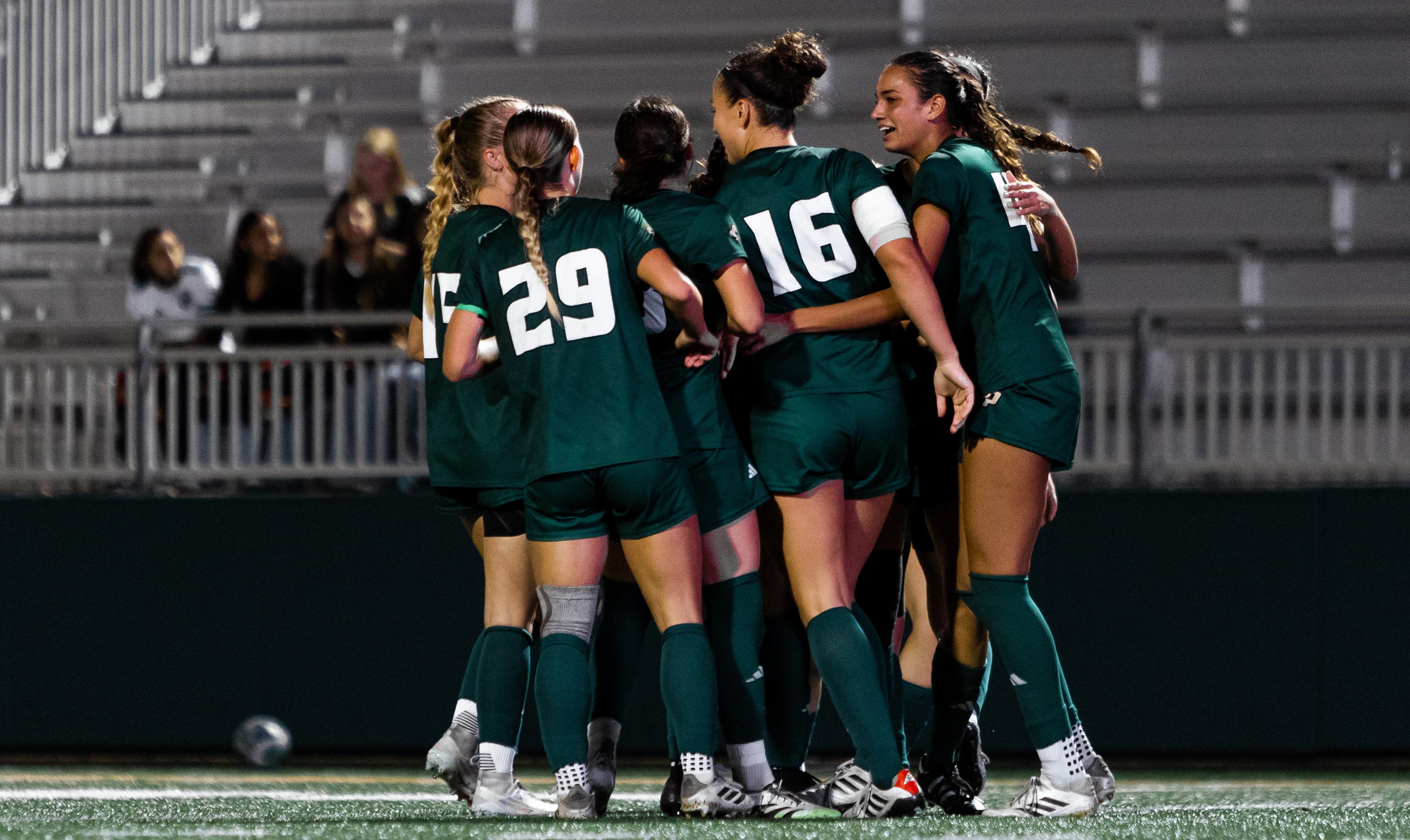
LISTEN TO THE WHOLE DOCUMENTARY HERE:

STORY BY QUINLAN TESELLE DESIGNED BY JULIA HAZEMOTO
After losing out on the starting job to start the 2025 season, redshirt freshman goalkeeper Shannon Porubski was back to where she was one year prior: working hard in practice every day to show the coaching staff that she deserved a chance to prove herself out on the field.
That opportunity arose for Porubski after the first five games of the new season.
While redshirt junior and transfer goalkeeper Alyssa Szarlacki had not done a poor job in goal, the Mustangs had started off their season with five ties. Cal Poly’s new coaching staff was looking for answers. Something had to change for the Mustangs to find
their footing with a tough conference schedule ahead of them.
Porubski was told in the hotel the night before the game that she would be starting against UNLV on Aug. 31.
“I just saw it as my opportunity that I had been waiting for, and I just wanted to make the most of it,” Porubski said. “I didn’t have too much pressure. I just felt prepared, and I was ready.”
Three hundred and ninety-eight days after her first practice at Cal Poly, Porubski made her official Mustang debut in a dominating fashion, securing the first victory of the season.
If Porubski was nervous, the scoresheet did not show it. Cal Poly went out and got their first win with a 1-0 victory over UNLV, and Porubski
made five saves in the 90-minute match for her first win and shutout.
“Soccer is a hard game, especially in our conference, so just being the best rock and foundation I can be for the team,” Porubski said. “I’m just really doing my role for the team.”
Since then, Porubski has started in all eight of the Mustang’s wins this season and helped the team have a 6-2-2 record in Big West Conference play, finishing the season in second in the Big West.
The Big West All-Freshman Team honoree has gone on to become a staple of the Cal Poly Women’s Soccer defense, leading the team to seven shutouts and eight wins after earning the role of the starting goalkeeper midway through the season.
In her first full year at the college level, Porubski earned Big West Freshman of the Week four times and Big West Defensive Player of the Week once. Despite all of her success this year, Porbuski’s Cal Poly career did not start out the way she imagined.
Last year, Porubski was chosen to redshirt for the 2024 season, meaning she did not see the field at all for preseason or regular season play, had limited travel on team trips but practiced with the team daily. While the decision was anticipated and discussed upfront, it was still a difficult adjustment for the freshman to make.
For some, this would have killed their confidence before even stepping foot on a collegiate field. For
Porubski, she viewed that season as an opportunity to develop as a player and learn from one of Cal Poly’s greatest goalkeepers, Mackenzie Samuel.
“That first season was really just about development and just doing everything that I could to put myself in a good opportunity when my time came around sophomore year,” Porubski said.
Samuel earned a variety of accolades while competing as a Mustang, most notably being named 2022 Big West Goalkeeper of the Year and becoming only the fifth four-time All-Big West honoree in program history. She was in her final season on the Cal Poly field while Porbuski waited in the wings.
Porubski credited her increased

level of play and abilities to training alongside Samuel. In the offseason, Porubski also did additional work to ensure that she was coming back to Cal Poly in her top form this season.
She played for Iron Rose FC, a semi-pro team in the Women’s Premiere Soccer League. In this league, Porubski was playing against some of the top high school, collegiate and post-collegiate women’s soccer players in the country.
“It’s just playing at a high level,” Porubski said. “I got a lot of playing time, so that kind of got me used to the speed of play, of what the college game would look like.”
Even with the extra play in the offseason and the mentorship from Samuel, Porubski still had to be patient at the start of the 2025 season
when she was named the backup goalkeeper to Szarlacki.
“They deemed us one and two,” Porubski said. “They told me, I just have to keep working hard. They need to have two starters, and when my opportunity presents itself, just take it and take full advantage of it.”
When Porubski started against UNLV, it was the first time that the redshirt freshman would log minutes in an official match. She had played 21 minutes of an exhibition match the year prior.
Senior defender Brennan Cole recognized all of the work that Porubski put in over the past year to get to this level of play. Cole said her confidence has grown significantly compared to last year.
“I don’t know what she did over the
I just saw it as my opportunity that I had been waiting for, and I just wanted to make the most of it
SHANNON PORUBSKI
summer, but she really stepped into the job she knew she had to do,” Cole said. “That gave her even more confidence. She’s really improved in these last few months we’ve been with Bernardo, and it’s been awesome to see and play in front of.”
The Mustang defense, with Porubski at the goal line, has hit their stride while finishing out their conference play. They helped the team to a four-game winning streak and recently snapped by a 1-1 tie with CSUN with shutouts in three of the last five games.
Porubski will look to continue her meteoric rise on the biggest stage the Big West has to offer as Cal Poly enters the Big West Tournament with the redshirt freshman in goal. The Mustangs have
not made the Championship match since 2023 and have not held the trophy since 2004.
“Now that I’m starting, the next goal I’m pushing for is Big West Goalkeeper of the year,” Porubski said. “Then, just bringing our team to a Big West Championship, and then seeing how far we can progress through the NCAAs.”
With the Big West All-Freshman Team selectee’s breakout season coming to a close, Porubski will continue to elevate the program in hopes of bringing home a Big West Championship back to San Luis Obispo.
STORY BY ASH PICKETT
DESIGNED BY NATALIA CELEBRINI
Ash Pickett is a business administration senior and opinion columnist for Mustang News. The opinions expressed in this article do not necessarily reflect those of Mustang Media Group. Some topics referenced in this article may not be suitable for all audiences. Reader discretion is advised.
When I first heard about Tea from my friends, they told me the app was a way to anonymously rate and comment on men around campus. They showed me a photo of one of our mutual friends that was posted on the app, and next to his name were 10 red flag symbols. One comment under his post said, “Wouldn’t be surprised at all if he cheated.”
I was pretty shocked to see so many red flags and unbecoming comments. I can’t say I’m super close with the guy, but I’ve been around him in a variety of settings, and he’s been nothing but respectful to me and the people around us. It felt like the people commenting were just there to spread negativity and make assumptions about him.
I was curious what the real point of this app was, or if it really was just built for girls to share their opinions on guys — gossip at scale, so to speak. I did some Google searches, then downloaded Tea myself. After using it, I feel strongly that this app is harmful to both male and female college students.
It cultivates polarization between men and women, and puts people down more than it protects them. Tea also encourages women to view men as opponents or people that should be feared, which is an inherently harmful mindset on both sides. For context, within the app, women
can post a photo and the first name of a guy they’re interested in knowing more about. Users can then react with a red or green flag and leave a comment if they have any gossip to share about him.
Marketers of the app call it a dating safety tool that protects women. It was built with the intention of helping women easily access basic background checks, identify catfishers, avoid sex offenders and people with criminal records and more controversially, read others’ anonymous opinions on these men. When I opened the app, I was asked to take a selfie to verify that I was, in fact, a woman. Once approved, I was prompted to create an alias as my username (it was emphasized that it should not contain any personal information), and was asked to agree to a set of rules before proceeding:
1. EVERYTHING YOU SAY MUST BE TRUE
2. DON’T LEAK POSTS TO YOUR GUY FRIENDS
3. BULLYING OR HARASSMENT IS NOT ALLOWED
4. DON’T POST LAST NAMES OR PERSONAL DATA
5. BE KIND, POSITIVE, AND RESPECTFUL
6. DON’T MAKE FUN OF MEN
7. NO POSTING WOMEN OR MEN UNDER 18
These sound great they’re clearly written to limit misuse. But how is Tea actually enforcing them? Tea’s privacy statement mentions that their team “employs both automated systems and human moderation
to monitor content,” yet I’ve seen people blatantly violate these rules.
THE ACCURACY OF CLAIMS ARE UNCHECKED
“Everything you say must be true” seems like more of a suggestion than a genuine and enforceable rule. It’s almost impossible to confirm or deny the authenticity of comments when they’re anonymous. And these claims are indeed unverified by Tea according to Fast Company, a media business brand.
I saw this happen firsthand. One post included a long paragraph for a caption that claimed the guy was
abusive to women and to animals and that he is a pedophile. The author detailed a long story about his disgusting past, yet multiple comments contained even longer stories about how all of the posted details were wrong and the man had actually been blamed for these crimes he didn’t commit.
There was a long and exhausting back-and-forth in the comments between multiple people, with both sides having completely opposing perspectives on what truly happened. It was someone’s word against someone else’s with no hard evidence to prove the truth, which further masked the real truth and
thus did just the opposite of the app’s intended purpose.
I’m not sure whether those claims against him were true or false, and I wouldn’t want to disrespect anybody’s experience. But regardless, it’s not doing anybody any good by having these conversations open for public viewing.
Tea is an organized place that encourages negative commentary around the business of ordinary people’s lives. It highlights them by name and face for all to see. It’s not like regular social media, where its main purpose is to foster stronger social connection, or even comparable to apps like Yik Yak, where posting ordinary people’s personal information is forbidden and moderated by a dedicated team, according to their website. Even though Tea claims via their privacy notice to moderate their content as well, it’s clear by scrolling on both apps that YikYak holds true to this standard where Tea does not. Even on sites like Reddit, there are subreddit moderators managing participant’s comments.
Tea allows people to put sensitive, unverified information into the world that anyone – whether it be employers, colleagues, friends or family – can view. That kind of exposure has the potential to tear somebody’s life apart.
In an increasingly data-driven world, we have a responsibility to respect people’s privacy to our utmost ability.
SOMETIMES THE APP STRAYS AWAY FROM SAFETY CONCERNS
Rule #6, “Don’t make fun of men” is not honored.
Here are some comments I found while I was scrolling on Tea for the
first time: “Sittin’ there with his ugly a— bowl cut,” “Small d—” and “Baby he just looks evil.” These have nothing to do with genuine concerns over safety.
We know from social media that behind a screen and a fake name, people will go to absurd lengths to put other people down. Hate comments and cancel culture are a prime example of this. Now take that and bring it to a college campus, in a space where people are encouraged to write anonymous comments about peers. This is just spreading negativity.
My friends brought up a point defending the app: although some people might abuse it and use it as a means of cyberbullying, it has the potential to prevent more intense crimes like assault and abuse. Because only women are allowed on the app and screenshots are prohibited, the men receiving hate comments unrelated to safety or dating might never even find out. Therefore, my friends claim that the positives outweigh the negatives. But these unchecked comments can still cause damage to people’s lives. If the means to the end is cyberbullying and potential libel, we need to seriously rethink whether that’s
worth it. I say it’s not.
When the app starts to come at the expense of online bullying, hate and potential libel, a line needs to be drawn. The app becomes a place of toxicity. It opens up the door for nasty rumors to spread which can genuinely hurt college students.
Tea definitely has the potential to make a positive impact, and, while I don’t have the stats to prove it, I’d bet that it has helped women in some capacity.
For one, it’s not uncommon that some men can get away with committing terrible acts such as cheating, or even abuse or assault. These men are often never held accountable for their actions when women feel isolated and afraid to report them, especially on college campuses, according to statistics from RAINN, an anti-sexual violence nonprofit. This app provides a way for those women to share their experiences anonymously. It can be a form of catharsis, and serve as a warning for other women to stay away from certain people.
Tea also offers a paid, subscription-based feature where users can run full background checks on any man to
learn their full criminal history. I’m not a huge fan of that tool being blocked by a paywall, but it’s unrealistic to expect a person to go on a deep dive hunt for a man’s records, so this feature can be quite helpful for safer dating.
There are also some comments on Tea that are nice, such as “Nicest person ever,” “Literally love him so much!” and “One of the coolest people I’ve met.” These prove that not everyone is misusing the app.
This app isn’t a bad idea in theory: it could help women avoid being catfished or spending time around men with criminal backgrounds. I’m also glad that Tea’s existence has opened up new conversations about how we can build tools to help women.
In practice, however, the way Tea is built is biased toward negativity, hate and division, rather than toward the genuine “girls supporting girls” ideology.
My hope is that eventually we can get to a tool that genuinely helps women without unfairly tearing anyone down in the process. In the meantime, we need to continue to think critically about apps like Tea to ensure we can reach our collective goal of safety without compromising on integrity.
IF YOU’RE LOOKING FOR DATING AND/OR SAFETY RESOURCES, HERE’S A LIST FOR YOUR REFERENCE:
Safer Cal Poly:
Cal Poly’s prevention education & confidential advocacy resource for sexual assault, intimate partner violence, domestic violence, stalking, sexual exploitation and harassment.
PULSE Cal Poly:
A collaborative, student-led health education program that seeks to achieve a balanced, thriving campus at Cal Poly.
Office of Student Rights & Responsibilities at Cal Poly:
Report incidents and learn your rights as a student.
RAINN:
The nation’s largest anti-sexual violence organization and operator of the National Sexual Assault Hotline.
Love is Respect:
Offers confidential support for teens, young adults, and their loved ones seeking help, resources, or information related to healthy relationships and dating abuse in the US.
National Domestic Violence Hotline: 1-800-799-SAFE (7233).
SATIRE BY MADI TAYLOR
DESIGNED BY JULIA HAZEMOTO
The Manure is a satire column created to find the humor in the daily life of Cal Poly students. If you’re looking for news, this is not it. If you’re looking for sports, this is kind of it, because we’re having a ball.
Madi Taylor is a sociology freshman and a satire columnist for Mustang News. The opinions expressed in this article do not necessarily reflect those of Mustang Media Group.
There’s nothing quite like being home for the holidays, especially Thanksgiving. The smell of freshly-baked pumpkin pie, a house full of family and your parents immediately reminding you why you left in the first place.
By now, you’ve packed your bags, bought your train ticket and are left wondering: What now? Well, congratulations — you’re officially going home for Thanksgiving. The place where time stands still, boundaries disappear and everyone suddenly has opinions about your haircut. It’s time to pretend to be grateful (again)! Here is everything that might ruin your break, in our highly-scientific “What to Expect Going Home for Thanksgiving” guide.
HOMECOMING (REMINDER: BOUNDARIES ARE THEORETICAL)
Get excited for the warm embrace of home — and by “embrace,” I mean
an assault of microaggressions, backhanded compliments, criticism and unsolicited life advice.
The train ride home is your last chance to flip up your septum ring, hide your vape and rethink those self-cut bangs (it’s too late now, the damage is done). Take a deep breath and practice your answers to “So, do you have a boyfriend yet?” and “Are you eating?”
Once you’re home, your mom immediately says, “You look so… different.” She might be smiling, but all she’s really thinking is: You’ve made choices, and I’m working very hard to not scream. Why do you look like a barista from Portland?
Meanwhile, your dad hits you with the dreaded, “So, how are classes going?” and suddenly you’re
explaining why a D in STAT 218 is actually “not that bad, statistically speaking.” (It’s not your fault you had to go out to the frats every weekend.)
Within 10 minutes at home, you’ve mentally regressed back to high school — slamming doors, sighing dramatically for no apparent reason and declaring that “no one understands you in this house.” It’s not your fault; your childhood home emits some kind of emotional immaturity.
Be prepared: when your younger sibling takes your spot on the couch, you will enter a rage usually reserved for parking tickets and Canvas errors.
Within seconds, you’re arguing over who “called it first” and
threatening to move out (again). Some things never change. Things cool down until you see them wearing your shirt and realize they raided your closet while you were away. At least three times a day, your mom yells, “Will you two just quit it?!”
You’ve made it to the annual Thanksgiving break mini high school reunion. This could go two ways: either a heartwarming night of reminiscing and laughter, or a speedrun of how quickly people can revert to their high school idiosyncrasies. You drive your old car, still smelling like late-night McDonald’s runs



and senior year panic. You park in the same spot you always did. If you’re lucky, you all laugh and fall back into the same patterns. Despite going to seven different schools in four different states, everybody has an eerily similar story about a weird guy who lives down the hall and a night at Sigma Nu they would rather forget. You find comfort in the fact that no one’s really changed much at all. Except maybe that one girl who got pregnant while

at Arizona State University (she might have changed).
You leave the reunion realizing maybe adulthood isn’t that fun. Good thing you’re headed back home, where your parents treat you like you’re five.
For one glorious week, you don’t have to worry about finding an empty washing machine. At home, some mystical force carries your dirty clothes straight to the washer and returns them to your closet in no time.
Your parents’ house also hosts an all-you-can-pack shopping spree. Running low on Band-Aids back on campus? Raid that medicine cabinet. Need some new

moisturizer? Just grab Mom’s. The best thing to remember is that you can take literally anything. So if you see Dad’s wallet sitting so patiently on the counter, grab that $20 bill (it’s not stealing if they love you).
It’s finally D-Day. You’ve been summoned from hibernation in your room, and it’s time to set the table — the only thing anyone trusts you with on Thanksgiving. This year, you’re being promoted to the adult table. Congratulations? While that may sound fancy, it’s less of an honor and more of a punishment. Gone are the carefree days of sneaking away for early dessert. Now you’re

trapped between Uncle Billy and his “just-asking-questions” politics. He will share some deeply misguided thoughts, and if at any point he starts a sentence with “I’m not racist, but…” immediately flee to the bathroom without a word.
“You know who’s really running this country…,” he says between awfully large spoonfuls of mashed potatoes. Not even a plate full of dry turkey and two pounds of gravy can save you. Suddenly, the kids’ table doesn’t look so bad anymore.
By Black Friday, you are beyond ready to head back to Cal Poly. Still, you can’t help but feel a little bit sad when it’s time to go, being a little spoiled brat can be nice.
Maybe you didn’t hate your hometown as much as you thought. But don’t worry. Once you’re back on campus, you won’t ever believe you voluntarily went home. Go hug those roommates and welcome back SLOme!




• 10 Month Program
• AI & Industr y-Aligned Learning
• Collaborative Industr y Projects
• GRE/GMAT Not Required
• Classes begin Summer 2026
Scan for the Virtual & In-Person Info Session Schedule
